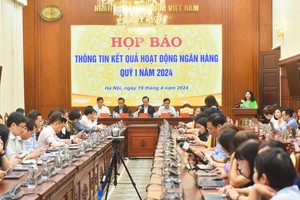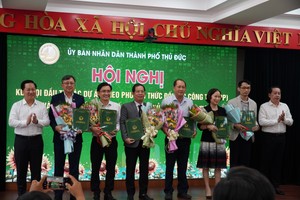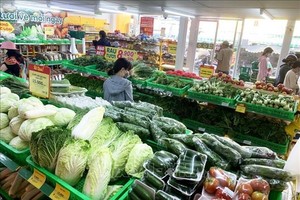 Organic rice farming combined with shrimp farming in Tra Vinh Province gives high efficiency. (Photo: SGGP)
Organic rice farming combined with shrimp farming in Tra Vinh Province gives high efficiency. (Photo: SGGP)
Tan Long Cooperative in Vi Thuy District of Hau Giang Province is a typical bright spot in clean rice production. At the beginning of April 2022, Mr. Nguyen Van Thich, Deputy Director of Tan Long Cooperative, was delighted to sign an agreement with farmers in Phung Hiep and Long My districts to grow another 24 hectares of clean rice. Besides technical instructions, the cooperative also buys commodity rice at VND500 per kg higher than the market price. Vi Thuy rice of Tan Long Cooperative is produced under a clean and organic process and is sold at VND26,000-VND30,000 per kg to key businesses. According to Mr. Tran Chi Hung, Director of the Department of Agriculture and Rural Development of Hau Giang Province, the province currently has only grown more than 100 hectares of organic rice. Meanwhile, the area of rice under clean process and meeting the VietGAP and GlobalGAP standards is large.
There is also an organic production model in the coastal provinces of the Mekong Delta, mainly on rice-shrimp land. Of these, Bac Lieu, Ca Mau, Soc Trang, and Kien Giang are localities with organic rice farming areas, attached with clean rice brands ST24 and ST25. Kien Giang has seven rice production facilities that have received organic certificates, with an area of 1,200ha and an output of over 3,000 tons per crop, mainly concentrated on shrimp farming land. Mr. Nguyen Van Dung, Director of the Department of Agriculture and Rural Development of Kien Giang Province, said that the organic rice-shrimp model in the districts of U Minh Thuong, An Minh, and An Bien had shown high efficiency, even increased the value by 4-5 times compared to the model of two rice crops a year. Shortly, Kien Giang would continue to convert to shrimp-rice production in coastal areas, such as Kien Luong, Hon Dat districts, and the remaining localities, to increase the area of organic rice.
Assoc. Prof.-Dr. Duong Van Chin, Former Deputy Director of the Mekong Delta Rice Research Institute, said that the problem is that farmers need to know the demand for organic products (domestic consumption and export) to organize production reasonably. According to scientists, when fertilizer prices increase sharply, as currently, Mekong Delta provinces need to combine both strategies of clean rice farming and organic rice farming based on market demand.
Minister of Agriculture and Rural Development Le Minh Hoan said that input raw material prices and consumption are uneasy problems and the reality that rice farmers have to face, especially the disruptions in the supply of raw materials. They have worked together to balance exports with imports, the main raw materials that impact agriculture. However, the market has a lag that is not a day or two. Minister Le Minh Hoan emphasized that farmers actively switching from chemical fertilizers to organic ones is not only a short-term solution but also opens up a long-term path.
Assoc. Prof. Dr. Duong Van Chin analyzed that organic agricultural production is a worldwide movement. Many countries prioritize the development of organic agriculture, while Vietnam has got initial achievements. The organic farming area has increased year by year, along with the standards to be certified organic. Many domestic and international service companies are providing organic certification services in Vietnam. It is necessary to distinguish between clean agricultural products and organic counterparts. Clean agricultural products are still produced conventionally and use fertilizers, including chemical fertilizers and pesticides, but farmers must ensure that their products meet the safety standards of each country. Meanwhile, organic agricultural products are produced under an organic process without using chemical fertilizers and chemical pesticides. Therefore, the yield is usually low, and the selling price must be high for farmers to make a profit.
There is also an organic production model in the coastal provinces of the Mekong Delta, mainly on rice-shrimp land. Of these, Bac Lieu, Ca Mau, Soc Trang, and Kien Giang are localities with organic rice farming areas, attached with clean rice brands ST24 and ST25. Kien Giang has seven rice production facilities that have received organic certificates, with an area of 1,200ha and an output of over 3,000 tons per crop, mainly concentrated on shrimp farming land. Mr. Nguyen Van Dung, Director of the Department of Agriculture and Rural Development of Kien Giang Province, said that the organic rice-shrimp model in the districts of U Minh Thuong, An Minh, and An Bien had shown high efficiency, even increased the value by 4-5 times compared to the model of two rice crops a year. Shortly, Kien Giang would continue to convert to shrimp-rice production in coastal areas, such as Kien Luong, Hon Dat districts, and the remaining localities, to increase the area of organic rice.
Assoc. Prof.-Dr. Duong Van Chin, Former Deputy Director of the Mekong Delta Rice Research Institute, said that the problem is that farmers need to know the demand for organic products (domestic consumption and export) to organize production reasonably. According to scientists, when fertilizer prices increase sharply, as currently, Mekong Delta provinces need to combine both strategies of clean rice farming and organic rice farming based on market demand.
Minister of Agriculture and Rural Development Le Minh Hoan said that input raw material prices and consumption are uneasy problems and the reality that rice farmers have to face, especially the disruptions in the supply of raw materials. They have worked together to balance exports with imports, the main raw materials that impact agriculture. However, the market has a lag that is not a day or two. Minister Le Minh Hoan emphasized that farmers actively switching from chemical fertilizers to organic ones is not only a short-term solution but also opens up a long-term path.
Assoc. Prof. Dr. Duong Van Chin analyzed that organic agricultural production is a worldwide movement. Many countries prioritize the development of organic agriculture, while Vietnam has got initial achievements. The organic farming area has increased year by year, along with the standards to be certified organic. Many domestic and international service companies are providing organic certification services in Vietnam. It is necessary to distinguish between clean agricultural products and organic counterparts. Clean agricultural products are still produced conventionally and use fertilizers, including chemical fertilizers and pesticides, but farmers must ensure that their products meet the safety standards of each country. Meanwhile, organic agricultural products are produced under an organic process without using chemical fertilizers and chemical pesticides. Therefore, the yield is usually low, and the selling price must be high for farmers to make a profit.
























